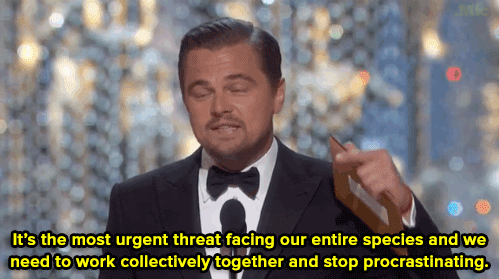
Climate change conversations can be overwhelming and anxiety-provoking. Consequently, discussing the issue in films can help in reaching a wider audience and increasing awareness among those who might not otherwise be interested in learning about such an urgent issue. Here are the top climate change movies to watch this year range from classic documentaries to the newest blockbusters.
Don’t look up (2021)
Don't Look Up, starring Leonardo DiCaprio, is the first film on my list of the top climate change films. The history-making Netflix movie is about a scientific professor who discovers a comet that is rapidly approaching the Earth and is likely to kill it with his younger pupil.
Together, they must persuade both the government and the populace of the existential threat and the potentially devastating effects it might have on civilization.
But when no one takes them seriously, the endeavour is harder than they imagine. The team faces challenges in overcoming the chaos of social media, governmental inertia, and an absence of media coverage.
An equivocal metaphor for climate change and its terrible implications is the comet that is rapidly approaching the globe. The movie also serves as a warning that, if politicians do not act soon, it will be too late to rescue the earth. It is evident that they are not doing enough.
The Day the Earth Stood Still (2008)
The 1951 science fiction film about an alien visitor that resembles a human and his enormous robot counterpart who settle on Earth is the next item on my list. Klaatu, the extraterrestrial, introduces himself and claims he is here to save the planet. Dr. Helen Benson, who was called to a US military facility, chooses to help him escape even though she sees him as a threat. But when she finds out that he wants to wipe off humanity from Earth. Why? because of climate change and human activity. The aliens have come to preserve the world and its creatures, with the exception of humanity, in the 21st-century adaptation because people are ruining the ecology on Earth. The film does an excellent job of highlighting the harm humanity has done and is still doing while issuing a dire warning about what lies ahead.
Eating Our Way to Extinction (2021)
Next up is a documentary that Kate Winslet, an Academy Award-winning actress, both narrates and executive produces. This interesting film investigates how a variety of unsustainable methods used by the global food sector contribute to the acceleration of climate change.
Eating Our Way to Extinction will surely alter your perspective on food and help you comprehend how the contemporary business is jeopardising food security through undercover film and the testimonies of Indigenous peoples.
Must Read: Books to read to understand Climate change, Ecology, Biodiversity and everything in between.
Princess Mononoke (1997)
The Japanese film Princess Mononoke, which debuted 25 years ago, is still regarded as one of the most cherished and current climate change films. Ashitaka, the main character, finds himself caught up in a conflict between the forest gods and Tatara, a mining colony, while on a quest to locate the cure for a demonic curse.
The politically charged animation portrays the effects of harming the environment and humanity's inability to coexist peacefully, presenting a powerful message that, regrettably, is still very much in force today.
Before the Flood (2016)
Before the Flood, a film produced by actor and Earth Alliance co-founder Leonardo DiCaprio and National Geographic, is one of the greatest depictions of climate change.
The moving documentary takes viewers throughout the globe and shows how many stakeholders are impacted by climate change due to deforestation, increasing sea levels, and other human activities.
The film urges world leaders to work toward a more sustainable future and provides viewers with lifestyle changes they can make, such as cutting back on their meat intake or electing officials who will bring about positive environmental change.
2040 (2019)
2040 is a surprisingly upbeat choice if you want something less depressing and more hopeful. The solution-focused documentary tells the narrative of an Australian father who imagines what life may be like for his daughter, who is four years old, in the future rather than concentrating on how urgent problems are.
A large portion of the feature is devoted to highlighting scientific advances and innovative solutions to address the problems posed by climate change, from renewable energy sources like rooftop solar to sustainable agricultural methods and the numerous applications of seaweed to combat the growing problem of food insecurity.

An Inconvenient Truth (2006)
An Inconvenient Truth is one of the most influential and outstanding environmental documentaries ever produced . The documentary stands noteworthy for its innovative narration as it recalls former US Vice President Al Gore's attempt to raise awareness of global warming in 2000.
Gore asserts that he has given this lecture-style presentation on climate change to audiences all around the world more than 1,000 times. The slide show includes compiles personal experiences, such as Gore's undergraduate education with an early climate specialist, in addition to comprehensive data, flow charts, and visualizations.Gore emphasises in the film's epilogue that "everyone of us is a source of global warming, but [...] the remedies are in our hands."
The Day After Tomorrow (2004)
This masterpiece by Roland Emmerich from 2004 depicts the tale of climatologist Jack Hall, whose research suggested that a superstorm may form and trigger devastating natural calamities all across the world.
In a situation akin to what Leonardo DiCaprio experiences in Don't Look Up, Hall must deal with criticism after UN representatives and global leaders choose to disregard his dire warnings.
The apocalyptic climatic disaster portrayed in The Day After Tomorrow is not as far-fetched as we might believe. The Earth enters an ice age in the film when the Atlantic Ocean stops moving. We cannot rule out the possibility that something similar will actually occur in the future as evidence of the ocean's water circulation system degrading grows.
Burning (2021)
Academy-Award winning Australian filmmaker Eva Orner addresses the unprecedented, disastrous, and fatal Australian bushfires known as "Black Summer" that occurred in 2019 and 2020.
The documentary sheds light on the global issue of climate change by telling the story from the perspectives of those who were directly involved in and affected by the fires as well as activists and scientists. It also exposes the Australian government's inaction and the irreparable harm that these catastrophic events left behind.
David Attenborough: A Life on Our Planet (2020)
A Life on Our Planet takes viewers across David Attenborough's 60-year career and highlights the disastrous changes our planet has seen in that time. He refers to it as his "witness statement" for the environment.
The 85-minute video, which debuted on Netflix in 2020, makes some very dire predictions for the future if mankind stays on its current course. These include a sixth mass extinction and a 4C increase in global temperature that will make much of the Earth uninhabitable.
The movie, In contrast to his usual nature documentaries, Attenborough adopts a more critical stance in Our Planet, denouncing how humans have treated the natural world. This makes his message of hope, which he delivers at the film's conclusion by discussing ways to combat the climate crisis, all the more powerful.







